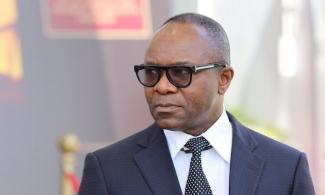
Kachikwu went further to allay fears of oil growing out of importance, saying that electric cars only make up two per cent of the market: “The oil industry is at a very critical stage in its life cycle, and don’t worry about all the nuances you hear about oil going out of stock. The reality, even when people point at electric cars, they still represent only two per cent of the instrument of mobility today. “When we talk of other forces coming to replace oil, the truth remains that oil demands continues to increase. More oil continues to be found by the day."

Ibe Kachikwu, Minister of State for Petroleum resources, says the Department of Petroleum Resources (DPR) sanctioned over 33 new mega projects in 2017 capable of adding 50 million barrels of oil into the country’s reserves.
He said this on Tuesday while delivering his ministerial remarks at the National Oil and gas Conference and Exhibition holding in Abuja.
“In 2017 alone, over 33 new mega projects adding volumes of over 50 million barrels equivalents were sanctioned by the DPR. We are increasing barrels — 36.18 billion barrels of proven reserves of crude oil and condensates as of first quarter of 2018, adding a life index of over 50 years at a depletion rate of 1.9 per cent.
Kachikwu said the country has an estimated 39 billion barrels of oil in its reserves and 199 trilion standard cubic fit of gas, up by 7 trillion. He said what is most important is the value derived from the petroleum and not how much is available.
“In Nigeria, our own numbers as released by the DPR point to figures in excess of 39 billion barrels of oil which will at the current consumption rate last over 50 years.
“So, there is enough reason to feel that oil will be there for a long time, but the reality is that the performance within the oil sector will differ. It is not how long it lasts, but what value it brings to the populace — the owners of the resource. How we are able to utilise whatever we find.”
Kachikwu went further to allay fears of oil growing out of importance, saying that electric cars only make up two per cent of the market: “The oil industry is at a very critical stage in its life cycle, and don’t worry about all the nuances you hear about oil going out of stock. The reality, even when people point at electric cars, they still represent only two per cent of the instrument of mobility today.
“When we talk of other forces coming to replace oil, the truth remains that oil demands continues to increase. More oil continues to be found by the day."
He also spoke on the potentials of the industry, noting that 80 open acres are under review and huge financial investment decisions in the works.
“There are about 80 open acreages currently under review to enhance the prospects in this sector. There are huge Final Investment Decisions (FIDs) in the horizon: Bonga Southwest and Zabazaba which will be first ultra-deep-water project in the region," he said.
He also gave some statistics on the level of exploration and production that are ongoing in the country:
“Our current production level is roughly 2.15 million barrels per day. The stability in the Niger Delta has helped. Today, we have about 46 E&P companies producing from over 180 fields as at the end of 2017. 55.6 per cent (of oil production) comes from JV portfolio, 35 per cent from PSCs, six per cent from sole risks and three per cent from marginal fields," he said.
“By the end of the first quarter of 2018, field developments with total expectant production of 200,000 barrels were approved by the DPR. Gas reserves are estimated at 199TCF up from 192TCF with the capacity to grow to up to 600TCF. We have to absolutely begin to look at how to provide gas for electricity and industrial use.
“Regional markets keep getting more intense and countries who do not set and firm up their regional markets are going to find very soon that even their oil, they cannot sell. With the emergence of the United States to almost independence in terms of energy provision and less reliance on foreign imported oil, the market has dwindled substantially. He said the country is looking forward to reducing its cost of production from $23 to $15
“We need to begin to look at how to sustain and firm up regional adherence to our kind of crude. Cost of producing oil in Nigeria continues to be extremely high on a comparative basis and the programmes that will drive the cost of production down must be one driven by business sense.”